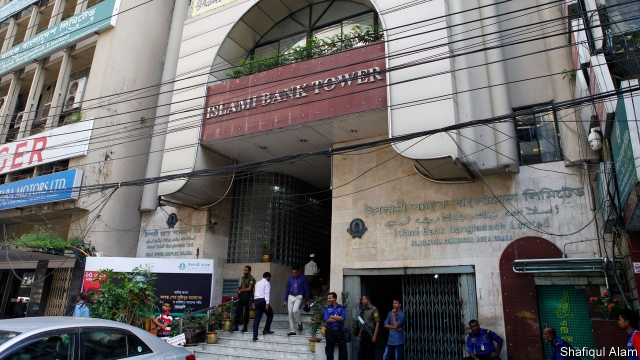Published in The Economist on Tuesday 9 April 2019
After the coup
Islami Bank Bangladesh has declined since a boardroom coup in 2017
It is now more similar to the country’s other crony-ridden banks

“It’s like the Midas effect in reverse,” says Badiul Majumdar of Shujan, an anti-corruption pressure group. “Everything the government touches turns not to gold, but rather from gold to dust.” He is talking about Islami Bank Bangladesh, which was rocked in 2017 when the government sent military-intelligence operatives to force out senior executives and board members, and replaced them with figures more to its liking. Fears that the boardroom coup would drag down a comparatively well-managed institution in a sector marred by political meddling and cronyism now appear to have been justified.
Established in 1983 as Bangladesh’s first bank run on Islamic principles, Islami thrived by handling a large share of remittances from emigrant workers and by lending to the booming garment industry. Its troubles stem from its links with Jamaat-e-Islami, Bangladesh’s largest Islamist party, which allied with Pakistan during the war of succession of 1971. One of the first acts of the current prime minister, Sheikh Hasina Wajed, after taking office in 2009 was to set up a court to try war crimes. Leading figures from the Jamaat were sentenced to imprisonment or hanging.
If anything, it is surprising it took Sheikh Hasina and her Awami League eight years to go after Islami—especially given allegations, including from America’s government, that it was linked to terrorist organisations. (The bank has denied the accusations and an official investigation launched in 2017 has yet to publish anything.) A second purge last year replaced more suspected Jamaat sympathisers with government allies.
Bangladesh’s state-owned banks have always had government men on their boards and in management, who lend to their allies. “But now this is happening in private banks like Islami Bank, too,” says Fahmida Khatun, the executive director of the Centre for Policy Dialogue, a think-tank in Dhaka.
According to a report by Bangladesh’s central bank, many of the loans Islami has granted have breached financial regulations. The report highlighted loans to six companies belonging to Nassa Group, a giant of the garment industry, which it says were granted without taking the required collateral and ignoring the fact that there were several Nassa subsidiaries that had defaulted in the past.
Islami’s operating profits for 2018 were 27.7bn taka ($330m), a 14.5% increase from 2017. But net profits, with provisions against bad loans and corporate taxes deducted, are expected to be much lower. Its market capitalisation has dropped to 42bn taka, down from 59bn taka at the end of 2017. Until recently Bangladesh’s most valuable bank, it is now worth just half as much as Brac Bank, its main rival.
At the end of last year non-performing loans (npls) came to 33.2bn taka. That is just 4.3% of all loans—better than the 11.5% average share across the industry. But this figure is distorted by far higher figures for state banks. Moreover, says Michael Puli, an analyst covering Bangladesh at Standard & Poor’s, a rating agency, not only is Islami’s npl ratio rising, but many of its stressed loans have been restructured or refinanced and thus no longer count as non-performing. It restructured 48bn taka of loans in 2018, more than any other Bangladeshi bank. Taken together, non-performing, restructured and refinanced loans came to 7.6% of the institution’s loan book at the end of 2017. The share will be higher in 2018, Mr Puli predicts.
People with political connections not only find it too easy to get loans from banks the government controls, including Islami Bank, says Biru Paksha Paul, a former chief economist at the central bank, but face little penalty for defaulting. “Wilful defaulters” have strained Bangladesh’s banks in the past three years, even as the economy has seen speedy growth. If the banking sector continues to deteriorate, will it be able to keep supporting growth? Responds Dr Khatun, “I doubt it.”
Correction (April 9th 2019): This piece previously ran an image of a bank that was not Islami Bank Bangladesh. This has now been amended.
This article appeared in the Finance and economics section of the print edition under the headline “After the coup”


